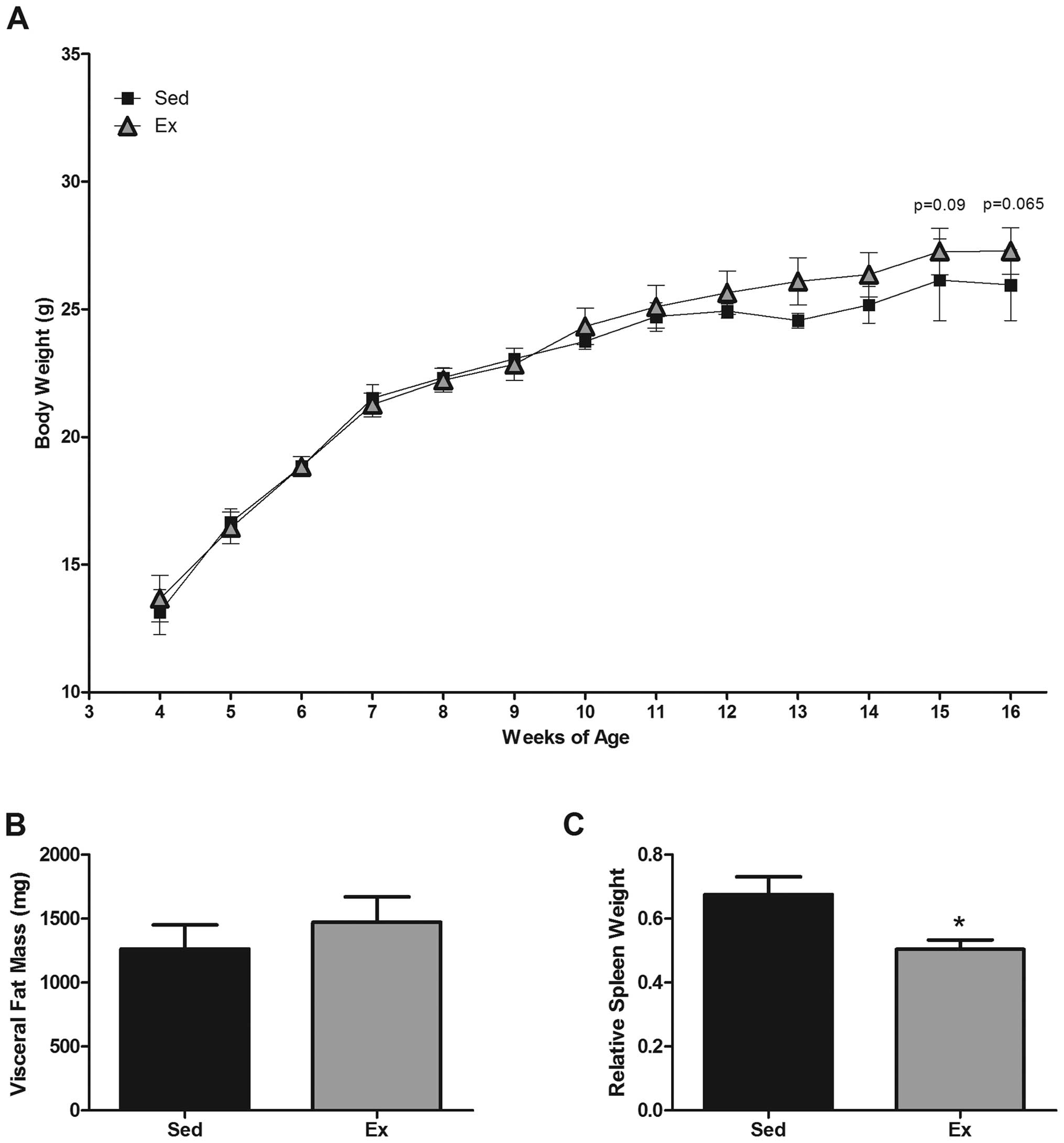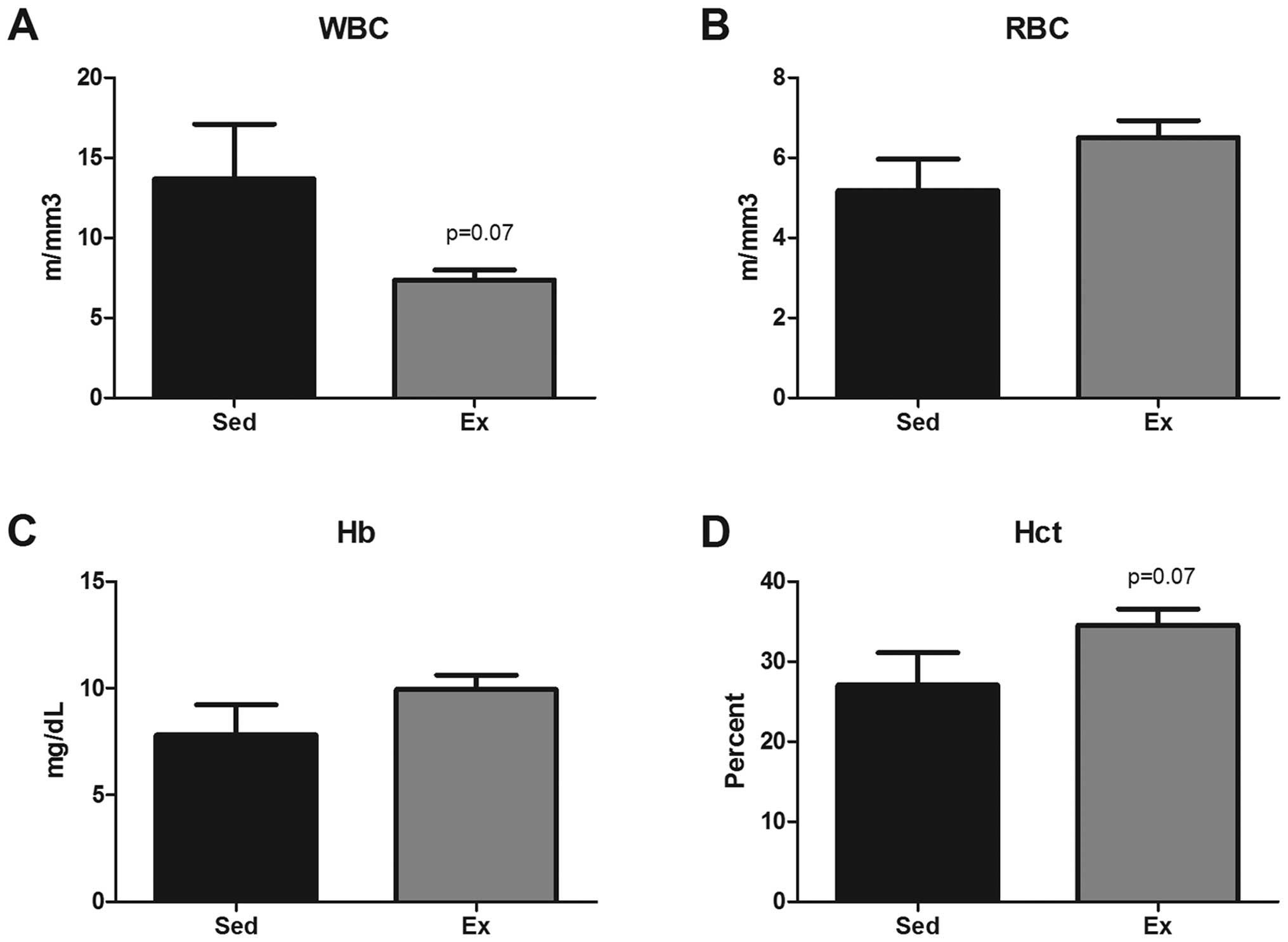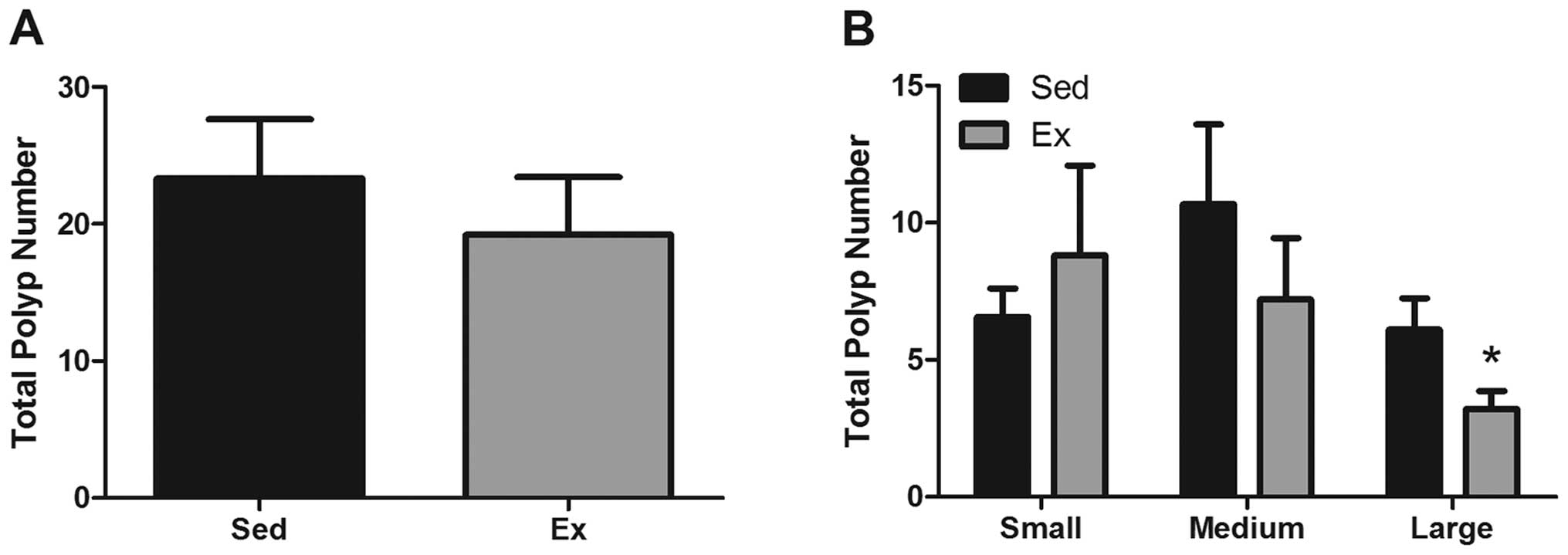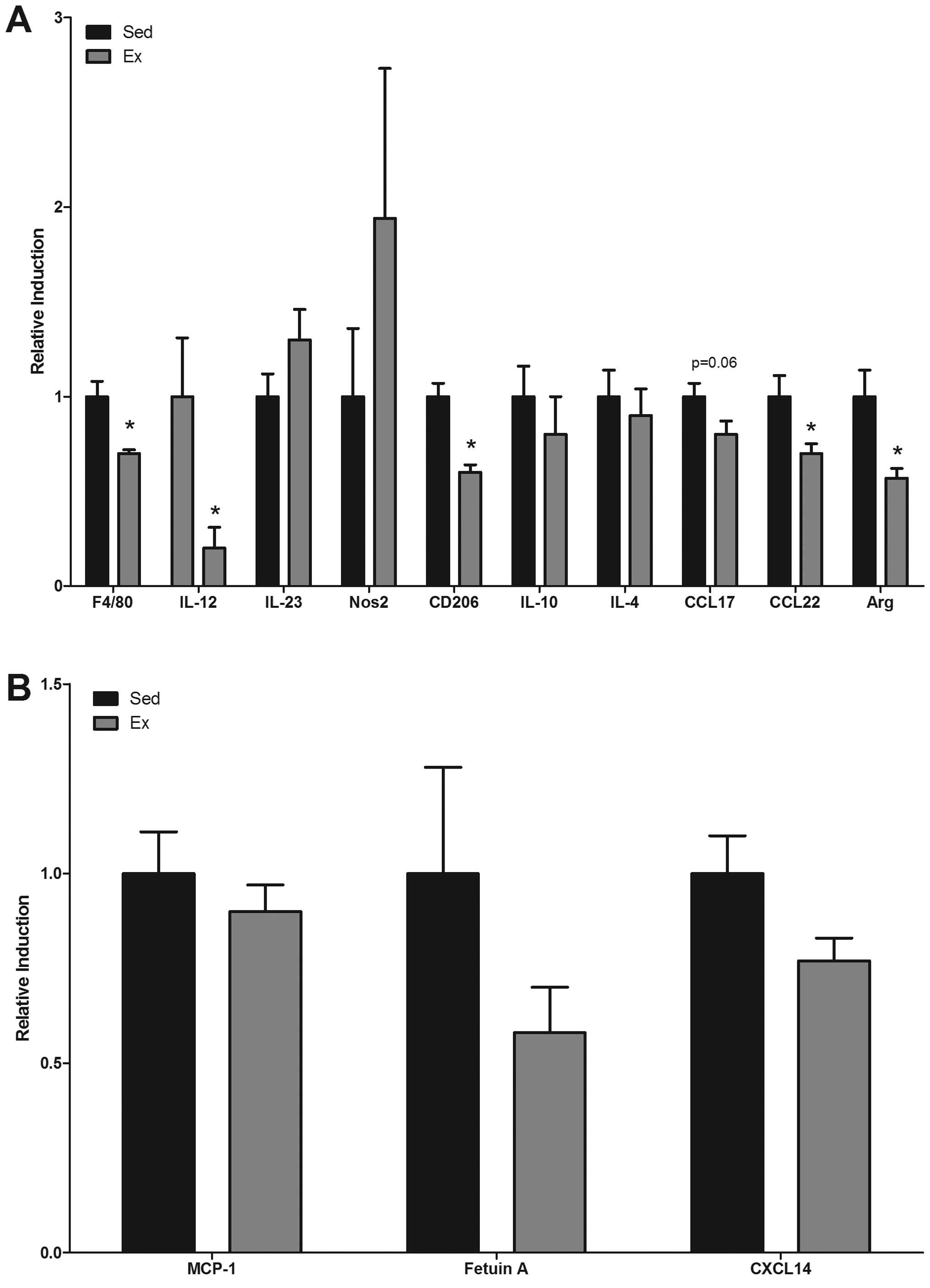|
1
|
Tenesa A and Dunlop MG: New insights into
the aetiology of colorectal cancer from genome-wide association
studies. Nat Rev Genet. 10:353–358. 2009. View Article : Google Scholar : PubMed/NCBI
|
|
2
|
Jemal A, Center MM, Ward E, et al: Cancer
occurrence. Methods Mol Biol. 471:3–29. 2009. View Article : Google Scholar
|
|
3
|
Jemal A, Siegel R, Ward E, et al: Cancer
statistics, 2008. CA Cancer J Clin. 58:71–96. 2008. View Article : Google Scholar
|
|
4
|
Howlader N, Noone AM, Krapcho M, et al:
SEER Cancer Statistics Review, 1975–2008. National Cancer
Institute; Bethesda, MD: 2010
|
|
5
|
Rustgi AK: The genetics of hereditary
colon cancer. Genes Dev. 21:2525–2538. 2007. View Article : Google Scholar : PubMed/NCBI
|
|
6
|
Lee IM, Shiroma EJ, Lobelo F, et al:
Effect of physical inactivity on major non-communicable diseases
worldwide: an analysis of burden of disease and life expectancy.
Lancet. 380:219–229. 2012. View Article : Google Scholar : PubMed/NCBI
|
|
7
|
Baltgalvis KA, Berger FG, Pena MM, et al:
Effect of exercise on biological pathways in ApcMin/+ mouse
intestinal polyps. J Appl Physiol (1985). 104:1137–1143. 2008.
View Article : Google Scholar : PubMed/NCBI
|
|
8
|
Sanchez NF, Stierman B, Saab S, et al:
Physical activity reduces risk for colon polyps in a multiethnic
colorectal cancer screening population. BMC Res Notes. 5:3122012.
View Article : Google Scholar : PubMed/NCBI
|
|
9
|
Mantovani A and Sica A: Macrophages,
innate immunity and cancer: balance, tolerance, and diversity. Curr
Opin Immunol. 22:231–237. 2010. View Article : Google Scholar : PubMed/NCBI
|
|
10
|
Solinas G, Germano G, Mantovani A, et al:
Tumor-associated macrophages (TAM) as major players of the
cancer-related inflammation. J Leukoc Biol. 86:1065–1073. 2009.
View Article : Google Scholar : PubMed/NCBI
|
|
11
|
Jedinak A, Dudhgaonkar S and Sliva D:
Activated macrophages induce metastatic behavior of colon cancer
cells. Immunobiology. 215:242–249. 2010. View Article : Google Scholar : PubMed/NCBI
|
|
12
|
Kaler P, Augenlicht L and Klampfer L:
Macrophage-derived IL-1beta stimulates Wnt signaling and growth of
colon cancer cells: a crosstalk interrupted by vitamin D3.
Oncogene. 28:3892–3902. 2009. View Article : Google Scholar : PubMed/NCBI
|
|
13
|
Kang JC, Chen JS, Lee CH, et al:
Intratumoral macrophage counts correlate with tumor progression in
colorectal cancer. J Surg Oncol. 102:242–248. 2010. View Article : Google Scholar : PubMed/NCBI
|
|
14
|
Bailey C, Negus R, Morris A, et al:
Chemokine expression is associated with the accumulation of tumour
associated macrophages (TAMs) and progression in human colorectal
cancer. Clin Exp Metastasis. 24:121–130. 2007. View Article : Google Scholar : PubMed/NCBI
|
|
15
|
Popivanova BK, Kostadinova FI, Furuichi K,
et al: Blockade of a chemokine, CCL2, reduces chronic
colitis-associated carcinogenesis in mice. Cancer Res.
69:7884–7892. 2009. View Article : Google Scholar : PubMed/NCBI
|
|
16
|
Kawanishi N, Yano H, Mizokami T, et al:
Exercise training attenuates hepatic inflammation, fibrosis and
macrophage infiltration during diet induced-obesity in mice. Brain
Behav Immun. 26:931–941. 2012. View Article : Google Scholar : PubMed/NCBI
|
|
17
|
Lesniewski LA, Durrant JR, Connell ML, et
al: Aerobic exercise reverses arterial inflammation with aging in
mice. Am J Physiol Heart Circ Physiol. 301:H1025–H1032. 2011.
View Article : Google Scholar
|
|
18
|
Rogers CJ, Zaharoff DA, Hance KW, et al:
Exercise enhances vaccine-induced antigen-specific T cell
responses. Vaccine. 26:5407–5415. 2008. View Article : Google Scholar : PubMed/NCBI
|
|
19
|
Woodland DL, Hogan RJ and Zhong W:
Cellular immunity and memory to respiratory virus infections.
Immunol Res. 24:53–67. 2001. View Article : Google Scholar : PubMed/NCBI
|
|
20
|
Weigelin B, Krause M and Friedl P:
Cytotoxic T lymphocyte migration and effector function in the tumor
microenvironment. Immunol Lett. 138:19–21. 2011. View Article : Google Scholar : PubMed/NCBI
|
|
21
|
Swann JB and Smyth MJ: Immune surveillance
of tumors. J Clin Invest. 117:1137–1146. 2007. View Article : Google Scholar : PubMed/NCBI
|
|
22
|
Garcia-Hernandez Mde L, Hamada H, Reome
JB, et al: Adoptive transfer of tumor-specific Tc17 effector T
cells controls the growth of B16 melanoma in mice. J Immunol.
184:4215–4227. 2010.PubMed/NCBI
|
|
23
|
Salama P, Phillips M, Grieu F, et al:
Tumor-infiltrating FOXP3+ T regulatory cells show strong
prognostic significance in colorectal cancer. J Clin Oncol.
27:186–192. 2009.
|
|
24
|
Curiel TJ: Tregs and rethinking cancer
immunotherapy. J Clin Invest. 117:1167–1174. 2007. View Article : Google Scholar : PubMed/NCBI
|
|
25
|
Tammariello AE and Milner JA: Mouse models
for unraveling the importance of diet in colon cancer prevention. J
Nutr Biochem. 21:77–88. 2010. View Article : Google Scholar : PubMed/NCBI
|
|
26
|
McClellan JL, Davis JM, Steiner JL, et al:
Intestinal inflammatory cytokine response in relation to
tumorigenesis in the Apc(Min/+) mouse. Cytokine. 57:113–119. 2012.
View Article : Google Scholar : PubMed/NCBI
|
|
27
|
McClellan JL, Davis JM, Steiner JL, et al:
Linking tumor-associated macrophages, inflammation, and intestinal
tumorigenesis: role of MCP-1. Am J Physiol Gastrointest Liver
Physiol. 303:G1087–G1095. 2012. View Article : Google Scholar : PubMed/NCBI
|
|
28
|
Baltgalvis KA, Berger FG, Pena MM, et al:
Activity level, apoptosis, and development of cachexia in
Apc(Min/+) mice. J Appl Physiol (1985). 109:1155–1161. 2010.
View Article : Google Scholar : PubMed/NCBI
|
|
29
|
Murphy EA, Davis JM, McClellan JL, et al:
Quercetin’s effects on intestinal polyp multiplicity and macrophage
number in the Apc(Min/+) mouse. Nutr Cancer. 63:421–426. 2011.
|
|
30
|
Murphy EA, Davis JM, McClellan JL, et al:
Curcumin’s effect on intestinal inflammation and tumorigenesis in
the ApcMin/+ mouse. J Interferon Cytokine Res. 31:219–226.
2011.
|
|
31
|
Nieman DC, Henson DA, Davis JM, et al:
Quercetin’s influence on exercise-induced changes in plasma
cytokines and muscle and leukocyte cytokine mRNA. J Appl Physiol
(1985). 103:1728–1735. 2007.
|
|
32
|
Baltgalvis KA, Berger FG, Pena MM, et al:
Interleukin-6 and cachexia in ApcMin/+ mice. Am J Physiol Regul
Integr Comp Physiol. 294:R393–R401. 2008. View Article : Google Scholar : PubMed/NCBI
|
|
33
|
Song JH, Kim YS, Yang SY, et al: Physical
activity and other lifestyle factors in relation to the prevalence
of colorectal adenoma: a colonoscopy-based study in asymptomatic
Koreans. Cancer Causes Control. 24:1717–1726. 2013. View Article : Google Scholar : PubMed/NCBI
|
|
34
|
Baltgalvis KA, Berger FG, Pena MM, et al:
The interaction of a high-fat diet and regular moderate intensity
exercise on intestinal polyp development in Apc Min/+ mice. Cancer
Prev Res (Phila). 2:641–649. 2009. View Article : Google Scholar : PubMed/NCBI
|
|
35
|
Puppa MJ, White JP, Velazquez KT, et al:
The effect of exercise on IL-6-induced cachexia in the Apc (Min/+)
mouse. J Cachexia Sarcopenia Muscle. 3:117–137. 2012. View Article : Google Scholar : PubMed/NCBI
|
|
36
|
Mehl KA, Davis JM, Clements JM, et al:
Decreased intestinal polyp multiplicity is related to exercise mode
and gender in ApcMin/+ mice. J Appl Physiol (1985). 98:2219–2225.
2005. View Article : Google Scholar : PubMed/NCBI
|
|
37
|
Chatterjee P, Seal S, Mukherjee S, et al:
Adipocyte fetuin-A contributes to macrophage migration into adipose
tissue and polarization of macrophages. J Biol Chem.
288:28324–28330. 2013. View Article : Google Scholar : PubMed/NCBI
|


















